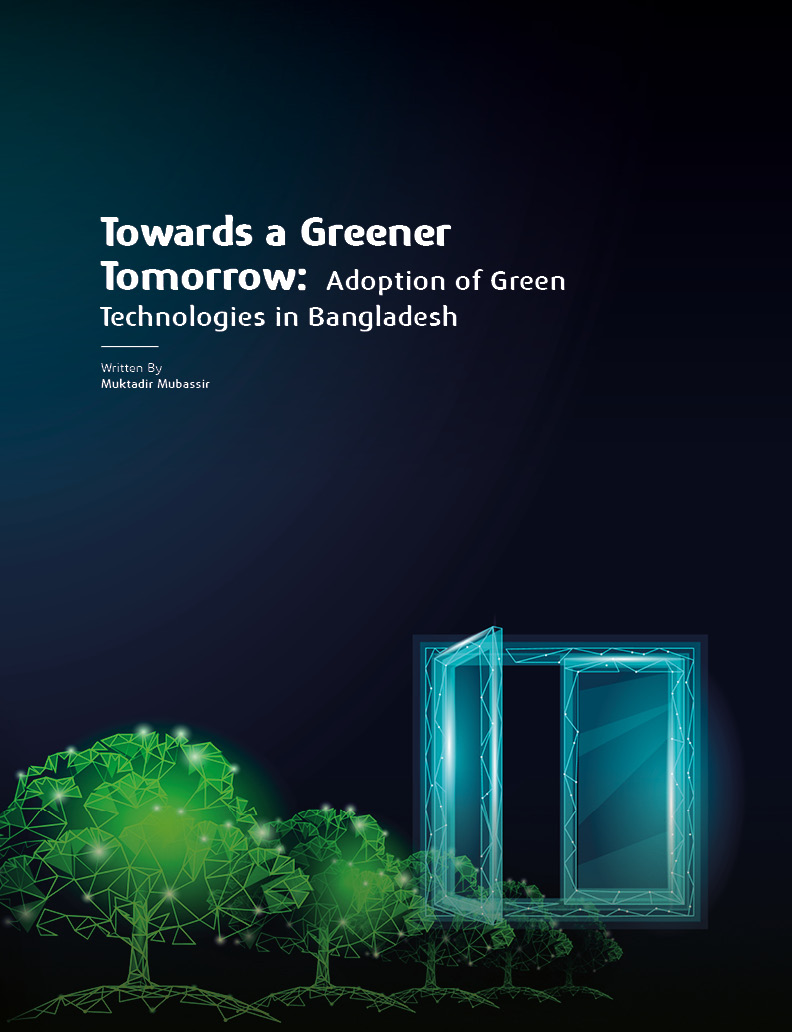
Towards a Greener Tomorrow: Adoption of Green Technologies in Bangladesh
Written By Muktadir Mubassir
Bangladesh, being one of the most climate-vulnerable countries in the world, urgently requires the widespread adoption of green technologies. The scope of green technology, or greentech in short, includes the utilisation of renewable energy sources, sustainable building practices, eco-friendly transportation, innovative waste management, and so on. The country has already made notable progress in some of the aforementioned areas.
Adoption of Sustainable Practices in the Energy Sector
Bangladesh is currently at such a point in its energy sector development that the country needs to reshape its energy sector to achieve sustainability and resilience. By adopting renewable energy sources and promoting environmentally friendly advancements in various industries, Bangladesh is actively steering towards a more sustainable and resilient energy infrastructure. With ambitious goals in place to reach a total generation capacity of 40,000 megawatts (MW) by 2030 and 60,000 MW by 2041, the emerging green energy sector is paving the way by providing creative solutions to address environmental issues while driving economic progress.
Diversification in Energy Generation
Bangladesh's energy generation landscape boasts a diverse array of power plants, each contributing significantly to the nation's energy mix. According to the Bangladesh Power Development Board, combined cycle plants are leading in terms of contribution to the country’s total power generation, providing 8,363 MW (33.57% of total capacity), followed closely by reciprocating engines, generating 8,023 MW (32.21% of total capacity). Other noteworthy contributors include steam turbines (3,742 MW or 15.02% of total capacity), gas turbines (1,438 MW or 5.77% of total capacity), hydroelectric plants (230 MW or 0.92% of total capacity), solar PV systems (459 MW or 1.84% of total capacity), and power imports (2,656 MW or 10.66% of total capacity).
Power generation in the country relies on a varied fuel mix, with gas taking the lead, accounting for a substantial portion amounting to 11,372 MW (45.65%). Following gas, furnace oil contributes 6,492 MW (26.06%), coal adds 2,692 MW (10.81%), and power imports provide 2,656 MW (10.66%). Apart from the major fuels, diesel contributes 1,010 MW (4.05%), hydro adds 230 MW (0.92%), and solar PV systems contribute 459 MW (1.84%).
As Bangladesh possesses a power generation capacity of 24,911 MW, it comes from a wide variety of power generation technologies and a wide array of fuels, all of which are crucial in fulfilling the nation's energy requirements.
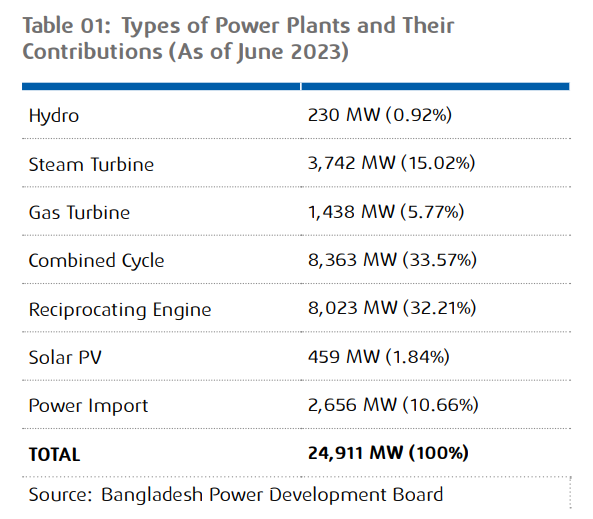
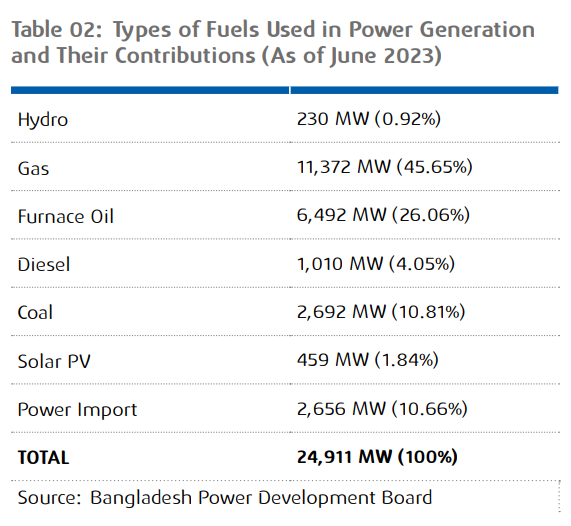
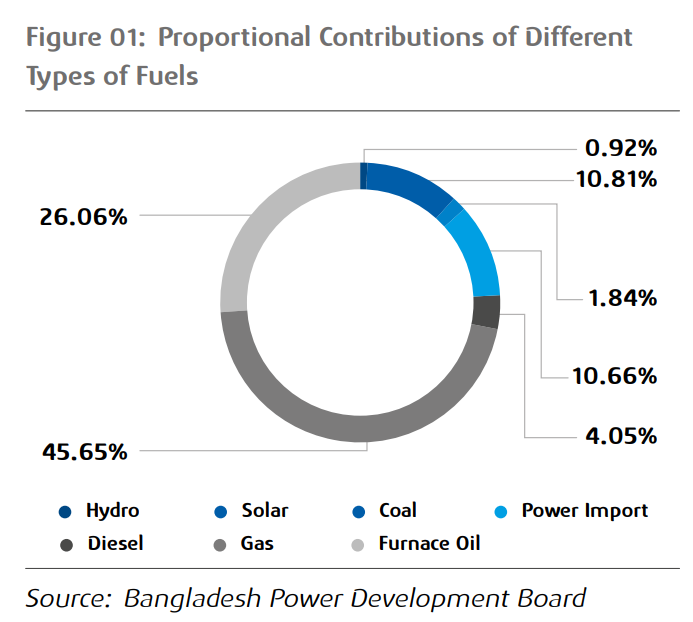
The power sector plays a pivotal role in Bangladesh's economy, keeping households lit and factories running. The country has already decreased the utilisation of gas from 88% to 44% with the aim of diversifying fuel and reducing dependence on one particular type of fuel. Moreover, the country is trying to generate at least 40% of its energy from renewable sources by 2041. Keeping that in mind, two nuclear power plant units with a combined capacity of 2,400 MW are under construction.
Challenges and Imperatives for Sustainability in the Energy Sector
The Observer Research Foundation reports that nearly 85% of the country's electricity is produced using fossil fuels such as natural gas and oil, with natural gas being the primary source. Due to its heavy dependence on fossil fuels, recent global energy trends, such as rising oil and gas prices due to geopolitical tensions and supply disruptions, have highlighted vulnerabilities in Bangladesh's energy sector. Diminishing reserves of natural gas and coal, along with the environmental degradation and health risks linked to fossil fuel consumption, call for a transition to renewable and sustainable energy sources. Incorporating solar, wind, biomass, biogas, hydro, and geothermal energy into the energy mix offers various benefits over fossil fuels, including abundance, cleanliness, decentralisation, and affordability, while also addressing social and environmental issues.
Harnessing Renewable Energy Potential
The country’s geographical position is highly favourable to taking advantage of abundant renewable energy prospects. With an average daily solar radiation of around 4.5 kWh/m2, the country is favourably positioned to utilise solar energy with the help of photovoltaic or thermal systems.
As per Mordor Intelligence, the solar energy market in the country is expected to enjoy significant growth, estimated at 0.55 gigawatts (GW) in 2024 and projected to reach 2.84 GW by 2029, reflecting a remarkable compound annual growth rate (CAGR) of 38.60% during the forecast period of 2024–2029. With an ambitious target of generating over 4,100 MW of electricity from renewable sources by 2030, solar power is expected to play a pivotal role.
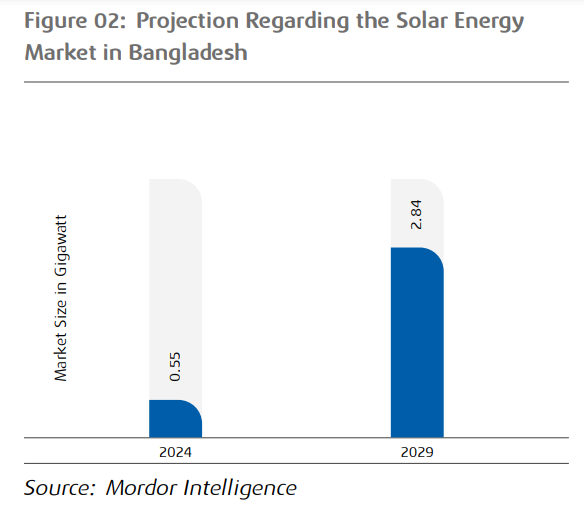
Moreover, Bangladesh's extensive coastline of 724 kilometres and numerous islands provide excellent sites for wind turbine installations, tapping into the nation's wind energy potential. Areas like Cox’s Bazar, Kuakata, Sandwip, and Saitn Martin exhibit the greatest capacity to generate electricity from wind power. It has to be mentioned that Bangladesh has achieved a major milestone in its journey towards sustainable energy by receiving Denmark's investment proposal of USD 1.30 billion for the development of the country's first offshore 500 MW wind energy project. This project signifies a significant step for the country towards sustainable energy sources. Copenhagen Infrastructure Partners and Copenhagen Offshore Partners, in partnership with Summit Group, submitted the investment proposal to the government in July 2023. Once completed, the 500 MW wind energy project is expected to contribute to the development of the country’s green energy infrastructure by directly providing electricity to households and businesses through an onshore substation.
The Sustainable and Renewable Energy Development Authority reports that Bangladesh produces approximately 1211.74 MW of electricity from sustainable sources as of March 2024. However, the contribution of wind power plants to this overall capacity is only 2.9 MW. Specifically, three government wind energy projects located in Sonagazi and Kutubdia are responsible for supplying this wind electricity.
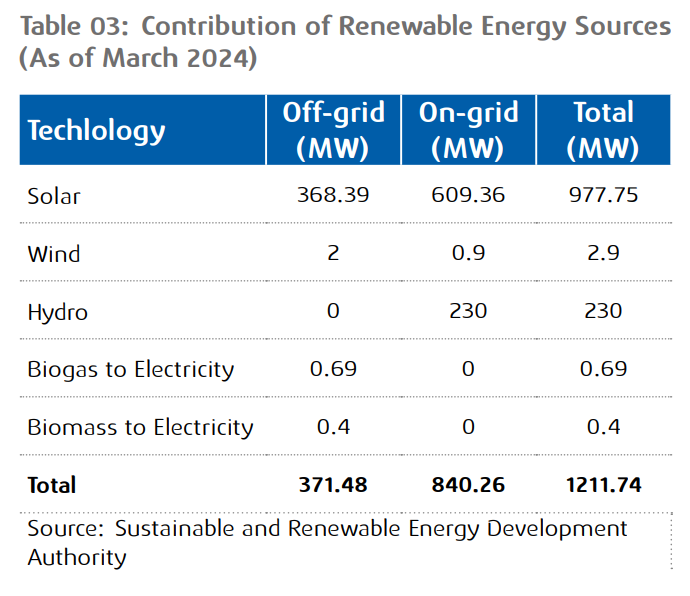
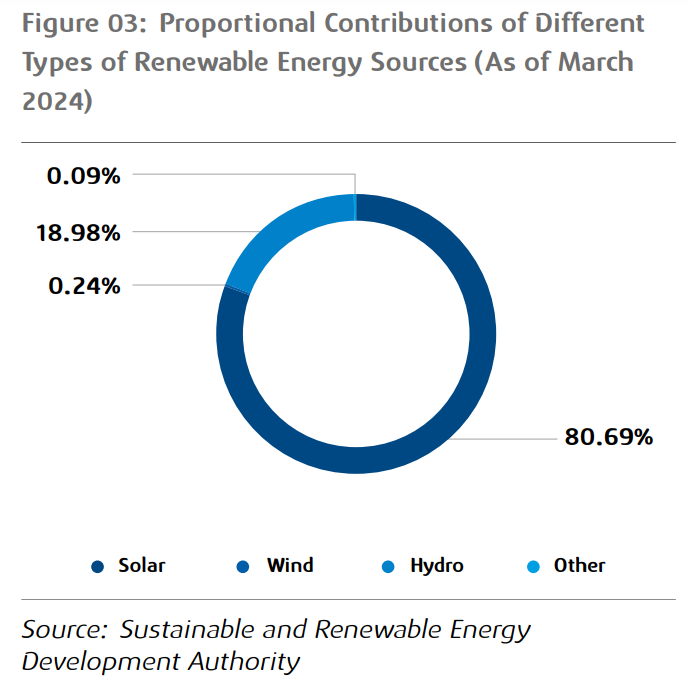
Utilisation of Biomass, Hydropower, and Geothermal Resources
Apart from solar energy and wind, Bangladesh possesses ample biomass resources, comprising agricultural leftovers, animal excrements, and municipal solid waste. These resources hold the potential to be converted into valuable biogas or biofuels. Additionally, the country's rivers and streams present favourable sites for the installation of small-scale hydropower plants, facilitating electricity production without causing harm to the environment or necessitating the displacement of communities.
Sustainable Practices in the Garment Industry
24 factories achieving LEED certification in 2023 are proof that Bangladesh's ready-made garment industry has made significant progress towards sustainability. Leadership in Energy and Environmental Design (LEED), a globally recognised green building rating system, underscores the industry's commitment to environmental stewardship and energy efficiency. This milestone elevates Bangladesh's position as a frontrunner in the global movement surrounding sustainability, with a noteworthy presence of LEED-certified green factories. With over 500 Bangladeshi factories currently in the process of obtaining LEED certification, the industry is determined to reduce energy consumption, water pollution, and carbon emissions.
Green Innovation and Entrepreneurship
The GreenTech Foundation Bangladesh, in collaboration with the Sustainable Finance Division of the Bangladesh Bank, spearheaded a pioneering initiative in 2021 known as the Green Inclusive Business Champions contest. This unique platform recognised and supported the top ten sustainable, innovative, and inclusive business ideas and startups contributing to environmental conservation and fostering a modern, resource-efficient, inclusive, and fair economy.
Addressing Challenges in the Way of Sustainability
Despite notable accomplishments, Bangladesh encounters several hurdles impeding the widespread adoption of renewable energy and green technology. These obstacles include limited awareness among the public and policymakers regarding their benefits, as well as unreliable data on sustainable resources and technology. Additionally, there are weaknesses in technical and institutional capacities, ranging from planning to maintenance, and a scarcity of financing for small and medium-sized enterprises focusing on green initiatives. Furthermore, insufficient coordination among stakeholders and infrastructure further obstructs progress in this field.
To address these obstacles, collaborative efforts are required. Strategies such as public awareness campaigns and educational programmes can help increase knowledge, while thorough evaluations of available resources and technologies are essential for making well-informed decisions. Enhancing technical skills through training sessions and facilitating financial access through innovative methods like green bonds are crucial. Utilising smart grid technologies and energy storage solutions is crucial for improving infrastructure. Enforcing strict standards and conducting audits are vital for effective project monitoring and evaluation.
Prospects in GreenTech
With ongoing support from governmental organisations, private investors, and international partners, Bangladesh's greentech industry appears to be on the right track. The sector is expected to experience significant expansion in the coming years. Recognising the pivotal role of renewable energy, the government has initiated various measures to foster its development and implementation. Notably, the government has set ambitious targets, aiming to generate 40% of electricity from renewable sources by 2041. Additionally, a range of policies and incentives have been introduced to stimulate private sector engagement and investment in renewable energy ventures.
Furthermore, the landscape of the greentech industry is evolving with the emergence of some startups. As of 2024, notable startups such as Jobike, Waste Bangladesh, BioShikha, and Waste-Bin have emerged as frontrunners in the green technology domain in Bangladesh. These innovative ventures signify the potential and dynamism within the sector, contributing to the country's broader sustainability agenda.
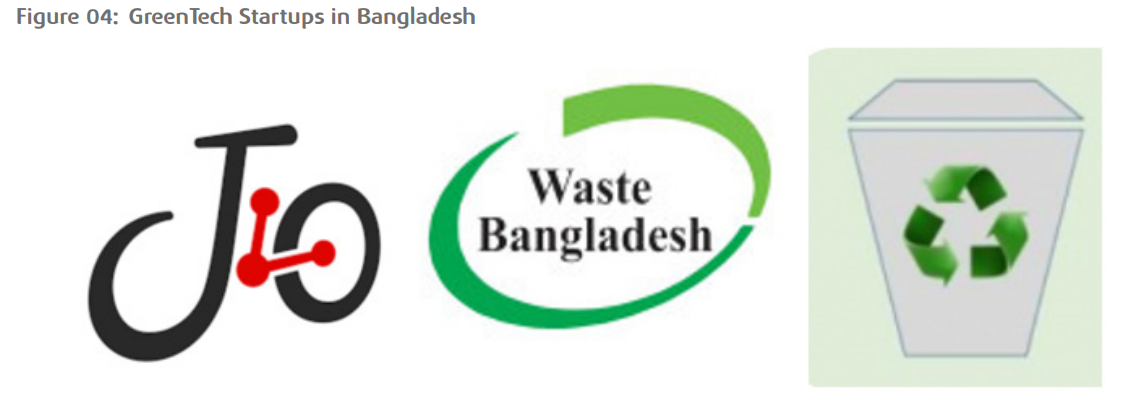
Bangladesh's progress in transitioning to a greener tomorrow requires pace in achieving energy sustainability. Through the adoption of renewable energy sources, the promotion of eco-friendly innovations, and tackling systemic obstacles, Bangladesh is establishing the foundation for a cleaner and more resilient energy landscape. With resolute determination and unified efforts, Bangladesh is well-positioned to spearhead the movement towards a brighter and more sustainable future.

Shattering Glass Ceilings: Women as Leaders of the Corporate World
The corporate landscape of Bangladesh is undergoing a transformation as diversity and inclusion are gaining overdue recognition. Women leaders are making notable strides, challenging traditional gender roles, and securing top positions in renowned corporations. This paradigm shift signifies a crucial step towards a more equitable and progressive work environment where talent and meritocracy prevail over gender biases.
Bangladesh is inching closer to achieving parity in tertiary education, meaning women are no less capable of achieving success in competitive arenas. Translating this gender parity to workplaces is what is required to ensure women's empowerment. However, despite advancements, the gender gap in workplaces remains, with women still underrepresented in decision-making roles. Hence, it's imperative to capitalise on women's capabilities by creating a supportive work culture that harnesses their talents and expertise.
Empowering women has impacts beyond just the corporates. It drives positive economic growth and serves as a beacon of inspiration for future generations. By advocating gender equality and fostering inclusive workplaces, Bangladesh can pave the way for a more prosperous and equitable society where everyone has the opportunity to thrive and succeed.
Md. Shah Jalal
Editor
IDLC Monthly Business Review
Download View